Top Carbon Footprint Tracking Software for 2025
Karel Maly
June 6, 2025
Navigating the Landscape of Carbon Footprint Management in 2025
Measuring and reducing your environmental impact is crucial. For organizations with complex supply chains, accurate carbon footprint tracking is a significant challenge. Carbon footprint tracking software provides the solution. This list explores eight leading platforms—Carbonpunk, Greenly, Sustain.Life, Planetly (by OneTrust), Plan A, Normative, Watershed, and CarbonChain—to help you choose the right tool for your needs. Discover which software best suits your organization in the CZ region and start minimizing your environmental impact in 2025.
1. Carbonpunk
For enterprises grappling with the complexities of carbon footprint management across extensive supply chains, Carbonpunk emerges as a powerful AI-driven solution. This cutting-edge platform offers a comprehensive suite of tools for tracking, analyzing, and reporting greenhouse gas emissions, ultimately empowering businesses to not only meet stringent regulatory standards but also transform sustainability into a strategic advantage. Specifically designed for organizations with intricate logistics networks, Carbonpunk goes beyond basic carbon footprint tracking software, offering advanced features like automated data integration, AI-powered optimization recommendations, and audit-ready ESG reporting.
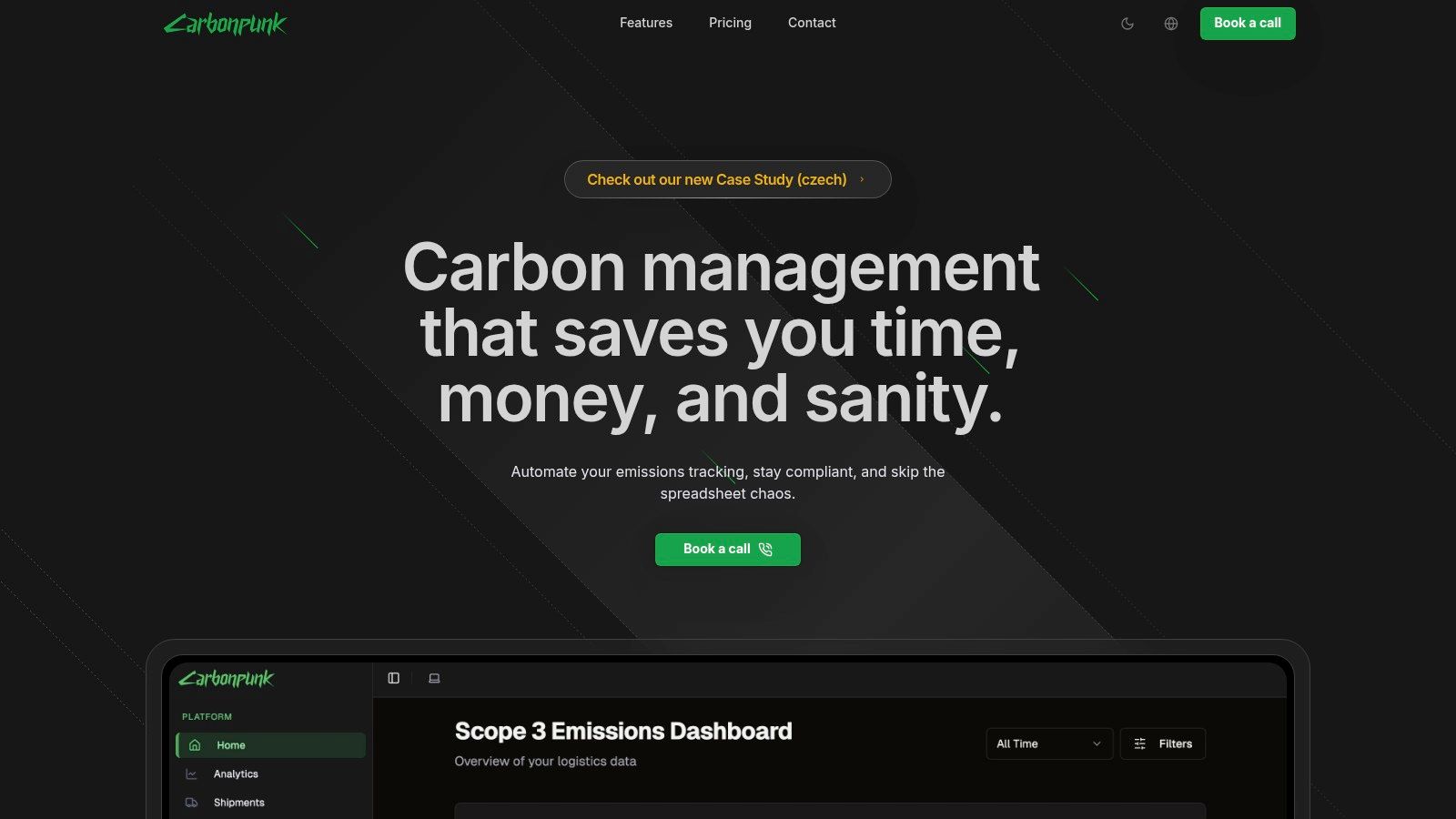
One of Carbonpunk's key strengths lies in its automated data collection process. The platform seamlessly integrates with existing logistics providers, directly pulling shipment data to eliminate manual entry and drastically reduce the risk of errors. For companies without direct integrations, CSV uploads provide a flexible alternative. This automated approach, coupled with advanced data validation and real-time monitoring, ensures over 95% data accuracy – a critical factor for credible reporting and informed decision-making. For companies in the CZ region navigating the increasing demands for accurate carbon accounting, this level of precision is essential.
Carbonpunk's AI-powered analytics engine elevates its capabilities beyond mere data collection. The platform analyzes emissions data, breaking down emissions by transport mode, route, and other relevant factors. This granular view provides invaluable insights into emission hotspots within the supply chain. More importantly, Carbonpunk's AI goes a step further by generating actionable recommendations for emissions reduction. These recommendations, which include route optimization and suggestions for alternative transport modes, have demonstrated a consistent ability to reduce emissions by 20-30%, translating into both environmental and cost savings. Learn more about Carbonpunk and how to utilize a carbon footprint calculator to reduce your impact.
Compliance with evolving regulatory frameworks is a paramount concern for businesses today. Carbonpunk addresses this directly by providing automated, audit-ready ESG reporting aligned with leading standards such as the GHG Protocol, TCFD, and CDP. This feature not only simplifies the reporting process but also provides assurance that the reported data meets the rigorous requirements of these frameworks. For compliance and regulatory affairs professionals in the CZ region, this functionality can significantly streamline reporting workflows and minimize the risk of non-compliance.
Carbonpunk’s customizable dashboards offer a user-friendly interface for visualizing and interpreting the collected data. These dashboards provide continuous impact tracking, predictive forecasts, and benchmarking capabilities, allowing users to monitor progress toward sustainability goals, identify emerging risks, and compare their performance against industry best practices. This continuous feedback loop empowers organizations to proactively manage their carbon footprint and make data-driven decisions.
While Carbonpunk offers a compelling value proposition for enterprises, there are a few considerations to keep in mind. Pricing details are not readily available on the website and require direct contact with the company, which may present a hurdle for initial budget assessments. Additionally, the platform’s advanced features and enterprise-grade design make it most suitable for larger organizations with complex supply chains. Smaller businesses or those with simpler logistics might find the platform’s capabilities exceeding their needs.
For logistics and supply chain managers, Chief Sustainability Officers, ESG teams, and environmental consultants dealing with complex supply chains, Carbonpunk provides a powerful tool for transforming carbon footprint management from a compliance burden into a source of competitive advantage. The platform's ability to provide accurate, real-time emissions data, generate actionable insights for reduction, and automate compliant reporting makes it a valuable asset in navigating the complexities of corporate sustainability. You can explore the platform further at https://www.carbonpunk.ai/en.
2. Greenly
Greenly is a robust carbon footprint tracking software solution designed to help businesses of all sizes measure, manage, and ultimately reduce their environmental impact. This comprehensive platform leverages the power of AI to automate complex carbon accounting processes, providing valuable insights and actionable recommendations for emissions reduction strategies. Specifically designed with ESG reporting requirements and sustainability standards in mind, Greenly is an excellent choice for organizations operating in the CZ region and seeking to navigate the evolving landscape of environmental regulations and stakeholder expectations. Whether your goal is to optimize your supply chain, improve your ESG reporting, or demonstrate a commitment to sustainable practices, Greenly offers a suite of tools to help you achieve your environmental objectives. This makes it a top contender in the carbon footprint tracking software landscape.
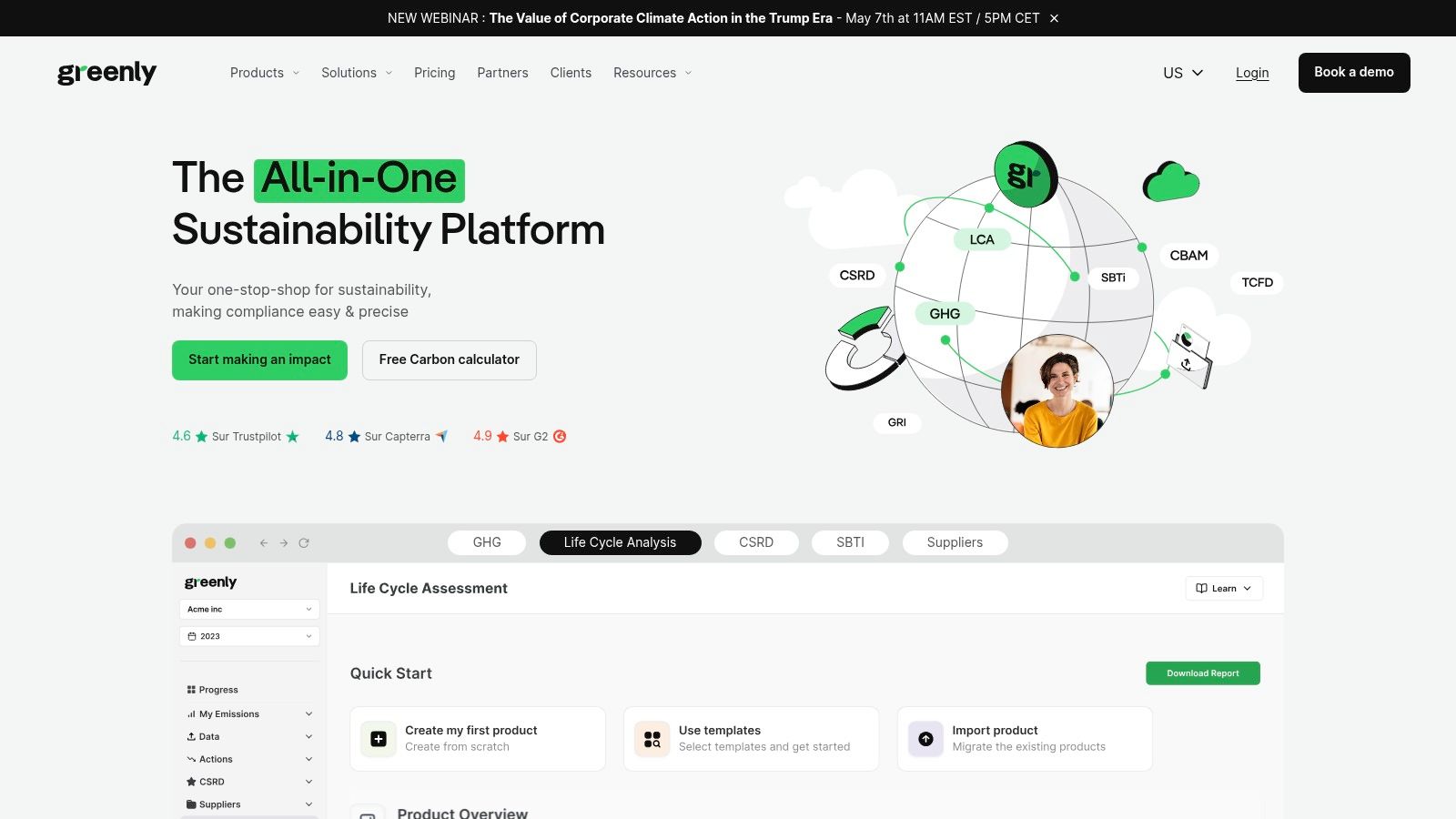
Greenly’s key strength lies in its ability to automate the often tedious and complex process of carbon footprint calculation across all three scopes (Scope 1: direct emissions from owned or controlled sources; Scope 2: indirect emissions from the generation of purchased energy; Scope 3: all other indirect emissions that occur in a company's value chain). This AI-powered data collection and analysis pulls from multiple sources, including financial data, energy bills, and supply chain information, significantly reducing the need for manual data entry and minimizing the risk of errors. This automation is particularly valuable for enterprise organizations with complex supply chains, a common characteristic of businesses in the CZ region's manufacturing and logistics sectors.
For logistics and supply chain managers, Greenly provides real-time emissions tracking and monitoring dashboards. This visibility into the carbon footprint of different transportation modes, routes, and suppliers allows for informed decision-making and the optimization of logistics operations to reduce environmental impact. Chief Sustainability Officers and ESG teams benefit from Greenly's comprehensive ESG reporting and compliance tools, which streamline the process of gathering data and generating reports according to various regulatory requirements. This is especially relevant in the CZ region as environmental regulations continue to evolve and reporting demands become more stringent.
Furthermore, Greenly offers carbon reduction roadmaps with personalized action plans, a feature particularly useful for environmental consultants and auditors working with clients in the CZ region to develop tailored sustainability strategies. These roadmaps offer concrete steps businesses can take to minimize their emissions and meet their sustainability goals. For compliance and regulatory affairs professionals, Greenly’s compliance features provide assurance that the organization adheres to the latest environmental regulations and avoids potential penalties.
While Greenly offers numerous advantages, it is essential to consider the potential drawbacks. Pricing, while not publicly available, is often cited as a potential barrier for smaller businesses. The platform's limited customization options for specific industry needs may also be a concern for some organizations. Finally, complex organizations should be prepared for a significant initial setup time to integrate all necessary data sources and configure the platform to their specific requirements. Implementation typically involves connecting Greenly to existing accounting systems, energy providers, and other relevant data sources. A dedicated onboarding process is provided to assist with this initial setup.
Comparing Greenly to similar carbon footprint tracking software tools highlights its strengths. While some competitors may focus primarily on specific industries or offer limited scope coverage, Greenly's comprehensive approach and automated capabilities make it a powerful solution for a wide range of organizations. Specifically within the CZ region, Greenly’s focus on compliance with European regulations and reporting standards makes it a particularly relevant choice.
In conclusion, Greenly earns its place on this list due to its comprehensive functionality, powerful automation, and focus on compliance. While the pricing may be a consideration for smaller businesses, the value proposition for larger organizations, particularly those with complex supply chains and demanding reporting requirements, is undeniable. For businesses in the CZ region looking to take a proactive approach to carbon management and ESG reporting, Greenly provides a valuable toolset to navigate the complexities of environmental sustainability. You can explore their offerings further on their website: https://greenly.earth.
3. Sustain.Life
Sustain.Life is a robust carbon footprint tracking software solution designed to empower small to medium-sized businesses (SMBs) in measuring, managing, and ultimately reducing their environmental impact. For companies in the CZ region looking to embark on their sustainability journey, particularly those without dedicated sustainability teams, Sustain.Life offers an accessible and streamlined approach to carbon accounting. It provides guided workflows, expert support, and a user-friendly interface to help businesses achieve their carbon neutrality goals. This makes it a valuable tool for logistics and supply chain managers, Chief Sustainability Officers, ESG teams, and compliance professionals striving to meet increasingly stringent environmental regulations and stakeholder expectations.
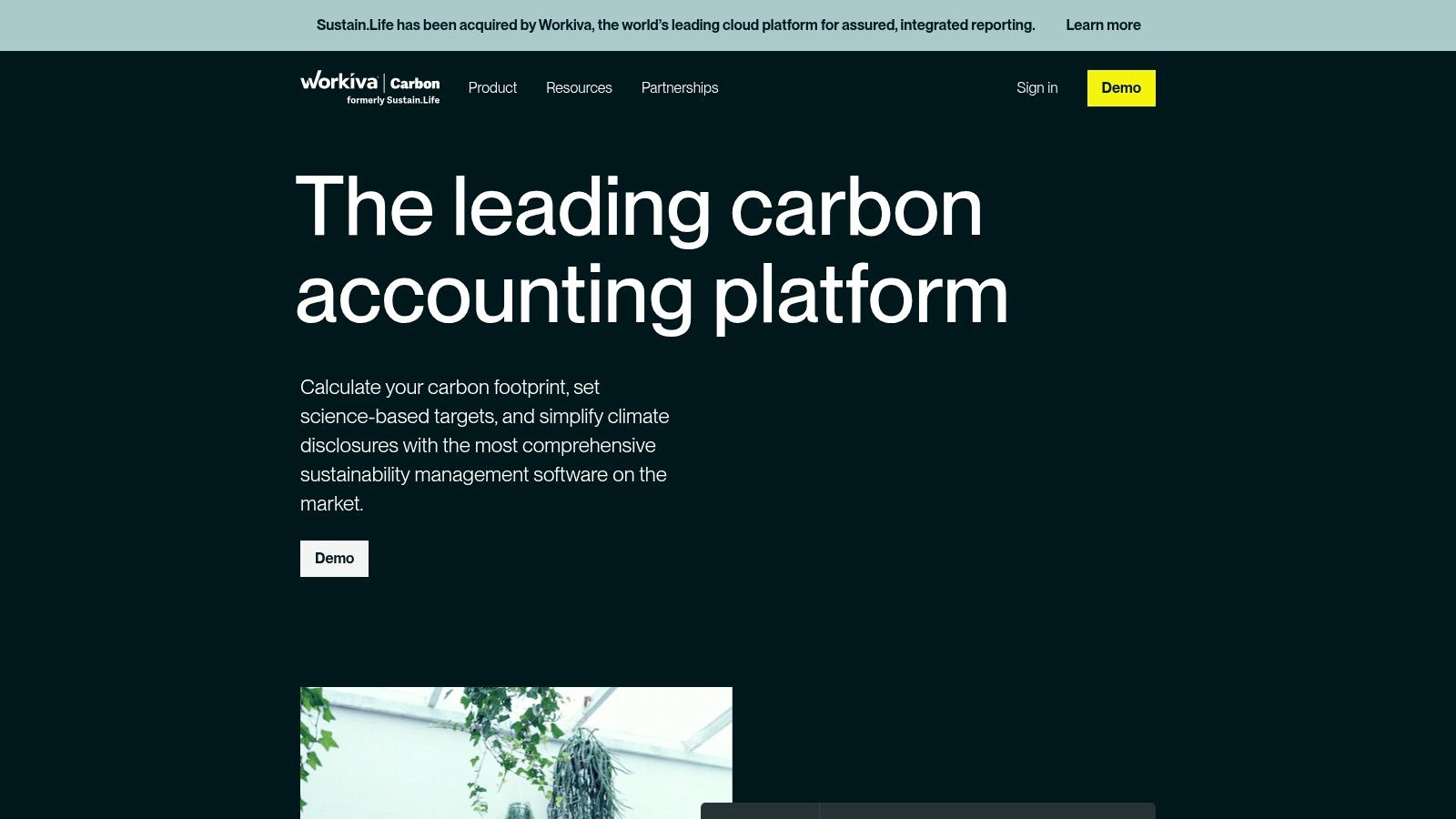
One of Sustain.Life's key strengths is its focus on simplifying carbon accounting. The platform offers a guided carbon footprint assessment with step-by-step workflows, making it easy for businesses to get started even if they have limited prior experience with carbon tracking. This structured approach helps ensure data accuracy and completeness, crucial for generating reliable reports and making informed decisions. The platform's integration with existing business systems further streamlines data collection, automating the process and reducing manual effort. This automated data collection is particularly beneficial for logistics and supply chain managers dealing with complex operational data from various sources.
For companies in the CZ region operating within intricate supply chains, understanding and mitigating scope 3 emissions is a significant challenge. While Sustain.Life may have limitations in tracking the full breadth of scope 3 emissions compared to some competitors focusing on larger enterprises, its guided approach helps SMBs begin tackling this complex area. The platform facilitates data collection and analysis related to upstream and downstream emissions, enabling businesses to identify hotspots and develop targeted reduction strategies. As the platform evolves, further enhancements to scope 3 tracking capabilities are anticipated.
Sustain.Life also simplifies the process of offsetting unavoidable emissions by providing access to a curated carbon offset marketplace featuring verified projects. This integrated offsetting feature streamlines the process, allowing businesses to directly invest in projects that support carbon reduction initiatives globally. The transparency of the marketplace, combined with clear pricing structures within the software itself, ensures accountability and simplifies budgeting for sustainability initiatives.
While Sustain.Life is an excellent tool for SMBs, it's important to acknowledge its limitations. Larger enterprises with complex sustainability requirements may find the platform lacking some of the advanced features offered by competitors. For instance, the scope 3 emissions tracking, while valuable, may not be as comprehensive as solutions designed specifically for large multinational corporations. Additionally, being a relatively newer platform, Sustain.Life has a shorter track record compared to some established players in the market. However, its focus on user education and guidance, along with regular updates and feature enhancements, demonstrates a commitment to continuous improvement.
For companies in the CZ region, implementation of Sustain.Life can be relatively straightforward. The platform’s user-friendly interface and guided workflows simplify the setup process. Integrating with existing business systems often requires minimal technical expertise, and the platform’s support team is readily available to assist with any implementation challenges. Starting with a pilot project focusing on a specific area of the business, such as transportation or energy consumption, can be a practical approach to familiarize the team with the platform and demonstrate its value.
Sustain.Life's transparent pricing structure, based on tiered subscriptions, allows businesses to choose a plan that aligns with their needs and budget. Specific pricing details are available on their website (https://sustain.life). This clarity in pricing makes it easier for businesses to incorporate sustainability initiatives into their financial planning.
In conclusion, Sustain.Life offers a valuable entry point into carbon footprint tracking for SMBs in the CZ region and beyond. Its user-friendly interface, guided workflows, and integrated offsetting capabilities simplify the process of measuring, managing, and reducing environmental impact. While it may not have all the advanced features of enterprise-grade solutions, its targeted approach, transparent pricing, and commitment to user support make it a compelling choice for businesses looking to embark on their sustainability journey and contribute to a greener future.
4. Planetly (by OneTrust)
For enterprise-level organizations seeking robust and comprehensive carbon footprint tracking software, Planetly (now part of OneTrust) offers a powerful solution. Designed to help businesses measure, manage, and ultimately reduce their environmental impact, Planetly provides a sophisticated platform for navigating the complexities of carbon accounting. This makes it an ideal choice for logistics and supply chain managers, Chief Sustainability Officers, ESG teams, and compliance professionals in the CZ region looking to gain a granular understanding of their emissions.
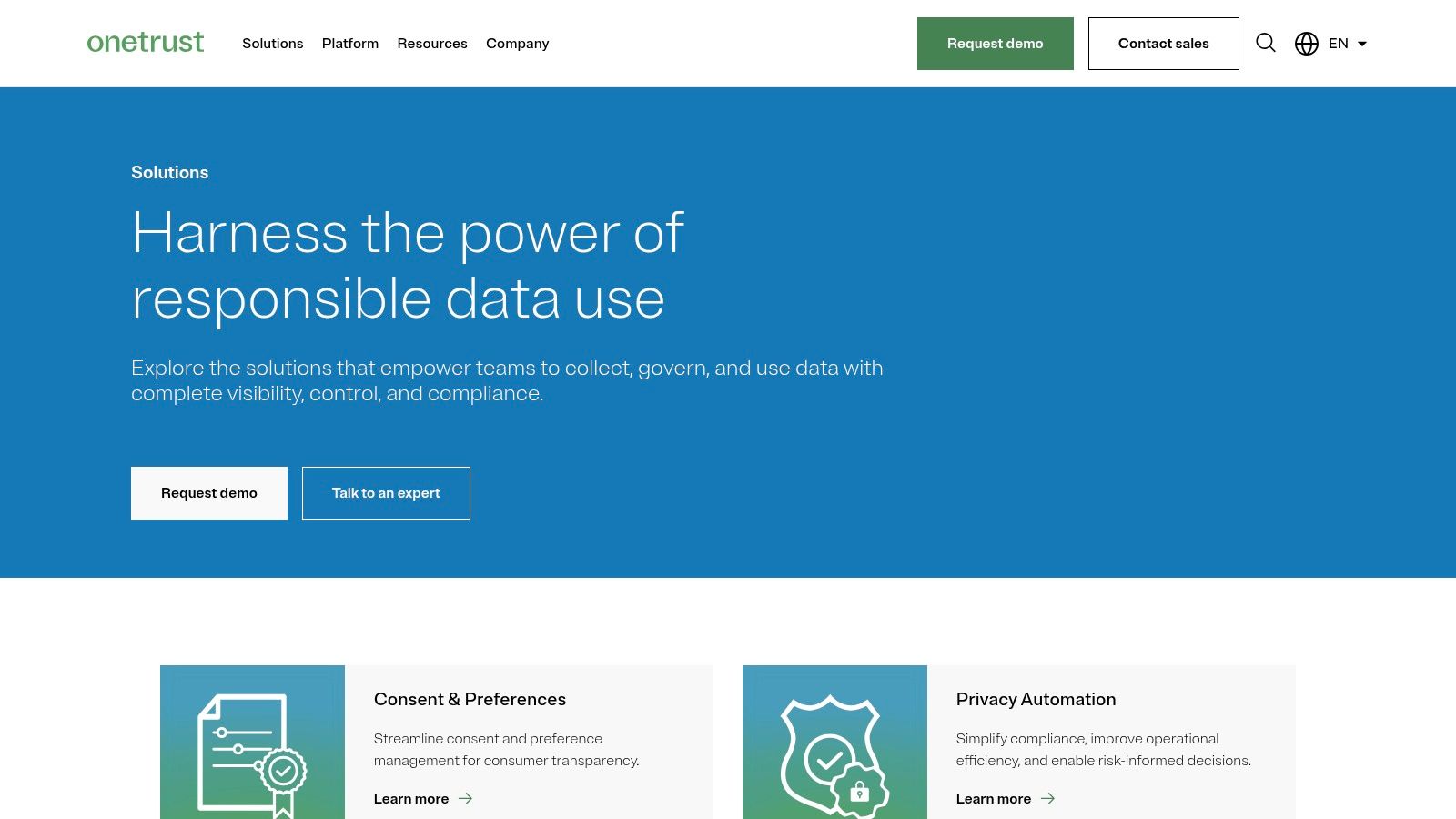
Planetly's strength lies in its comprehensive approach to carbon footprint measurement. It covers all three emission scopes (Scope 1: direct emissions from owned or controlled sources; Scope 2: indirect emissions from purchased energy; Scope 3: all other indirect emissions across the value chain), providing a holistic view of an organization's environmental impact. This is particularly valuable for businesses in the CZ region with complex supply chains and international operations, as it allows them to track emissions from every stage of their operations, from raw material sourcing to product delivery and end-of-life management. This level of granularity is crucial for identifying emission hotspots and developing effective reduction strategies.
A key differentiator for Planetly is its advanced data integration capabilities. It seamlessly connects with existing Enterprise Resource Planning (ERP) and financial systems, automating data collection and ensuring accuracy in carbon accounting. This integration minimizes manual data entry, reduces the risk of errors, and streamlines the reporting process. For busy logistics and supply chain managers in the CZ region, this automation frees up valuable time and resources, allowing them to focus on strategic initiatives.
Planetly also provides tools for setting and tracking science-based targets, aligning corporate sustainability goals with the latest climate science. This feature is invaluable for companies committed to demonstrating their commitment to climate action and meeting the increasing demands of stakeholders for environmentally responsible practices. In the CZ region, where environmental regulations are becoming increasingly stringent, this functionality can help organizations stay ahead of the curve and ensure compliance.
While Planetly excels in its comprehensive features and enterprise-grade capabilities, it's important to consider its drawbacks. The platform is targeted at larger enterprises and comes with a higher cost point. Pricing information is not readily available and typically requires contacting Planetly directly. The setup process can also be complex, requiring technical expertise. For smaller organizations with limited resources, Planetly's robust functionality may be overkill, and simpler, more cost-effective carbon footprint tracking software solutions might be more suitable.
Implementing Planetly requires careful planning and a dedicated project team. It's advisable to involve IT specialists to ensure seamless integration with existing systems. Engaging with Planetly's customer support team early on can also be beneficial for navigating the setup process and customizing the platform to specific business needs.
Compared to other carbon footprint tracking software, Planetly stands out in its depth of analysis and integration capabilities. While tools like Persefoni and Greenly offer similar functionalities, Planetly’s focus on enterprise-level businesses provides it with a unique edge in handling complex data sets and integrating with sophisticated business systems. This is particularly beneficial for large organizations operating in the CZ region with intricate supply chains and high data volumes.
For companies seeking a comprehensive, robust, and enterprise-grade solution for carbon footprint tracking, Planetly offers a compelling proposition. Its advanced features, data integration capabilities, and science-based target setting tools empower organizations to gain a deep understanding of their environmental impact and drive meaningful reductions in their carbon emissions. While the cost and complexity may be a barrier for smaller organizations, larger enterprises in the CZ region, particularly those in logistics, manufacturing, and other carbon-intensive industries, will find Planetly's capabilities invaluable in their journey towards sustainability. Visit their website at https://planetly.com for more information.
5. Plan A
Plan A stands out as a robust solution in the realm of carbon footprint tracking software, going beyond basic tracking to provide a comprehensive platform for carbon management and broader ESG (Environmental, Social, and Governance) reporting. This makes it a particularly valuable tool for businesses in the CZ region looking to comprehensively address their sustainability goals and meet increasing regulatory requirements. It's more than just calculating your carbon footprint; it's about actively managing and reducing it, while also streamlining your ESG reporting process.
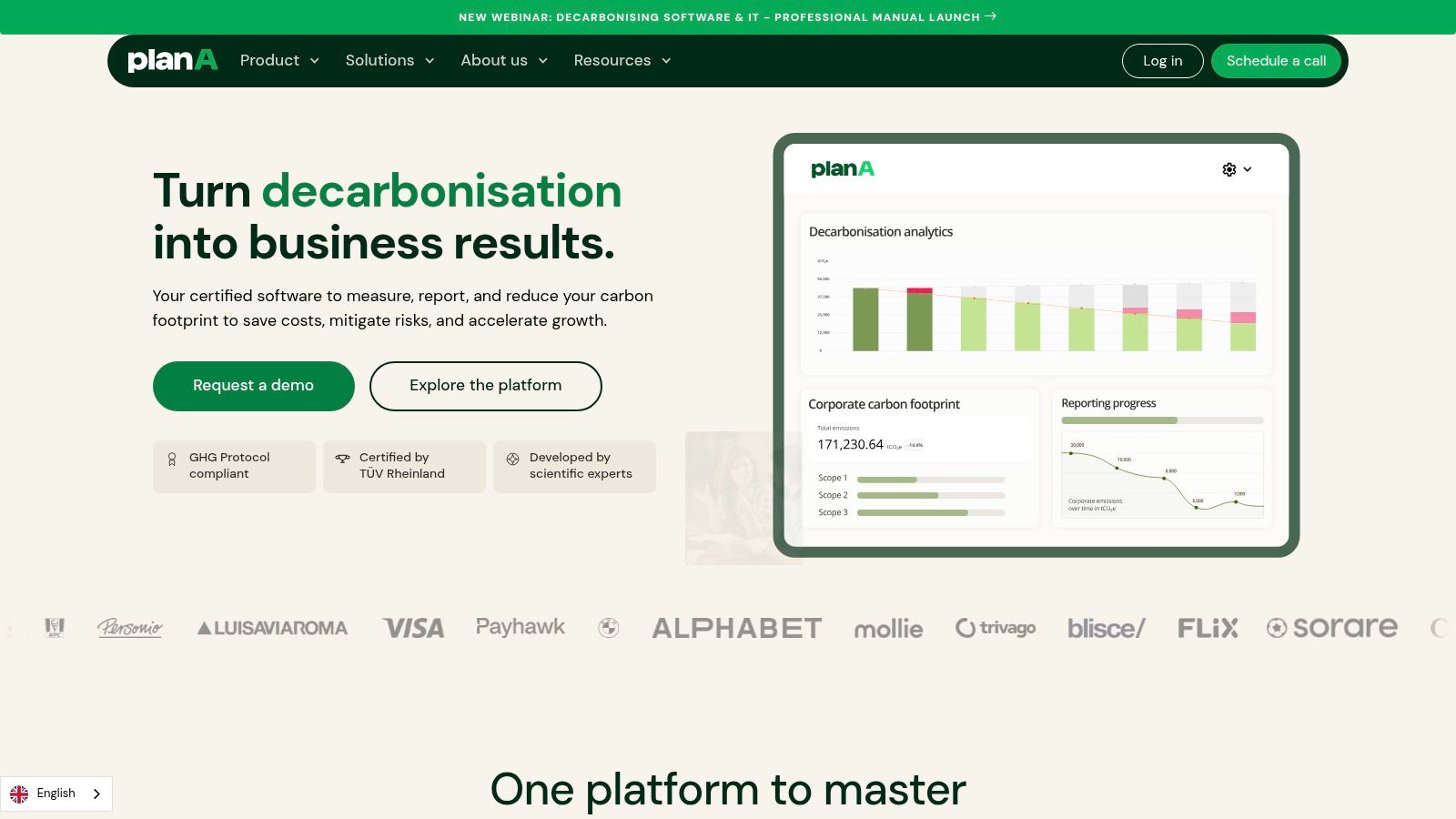
For logistics and supply chain managers in the CZ region, grappling with Scope 3 emissions is a significant challenge. Plan A addresses this directly with its dedicated supply chain engagement tools. These tools enable businesses to collect emissions data from their suppliers, facilitate collaborative emission reduction initiatives, and gain a clearer picture of their entire value chain's environmental impact. This is crucial in a region with intricate supply chains and increasing pressure to demonstrate responsible sourcing and sustainable logistics.
Chief Sustainability Officers and ESG teams will find Plan A's comprehensive approach invaluable. The platform combines carbon accounting with broader sustainability management, providing a centralized hub for data collection, analysis, and reporting across various ESG metrics. This simplifies the often complex process of gathering data from disparate sources and ensures consistency in reporting, particularly beneficial for complying with evolving ESG regulations in the CZ region. You might want to Learn more about Plan A and its ESG reporting capabilities.
Compliance and regulatory affairs professionals will appreciate Plan A's features designed to streamline compliance with evolving environmental regulations. The platform provides updates on regulatory changes, helps identify relevant reporting requirements, and facilitates the generation of compliant reports. This is especially important in the CZ region, where businesses are navigating a complex landscape of EU and national environmental regulations.
Enterprise organizations with complex supply chains benefit from Plan A's scalability and robust data management capabilities. The platform can handle large datasets from diverse sources, providing a holistic view of the organization's environmental performance. Its LCA (Life Cycle Assessment) capabilities allow for product-level analysis, enabling businesses to identify hotspots and optimize product design for reduced environmental impact. This granular level of insight empowers businesses to make data-driven decisions and demonstrate their commitment to sustainability throughout their operations.
For environmental consultants and auditors, Plan A serves as a powerful tool for conducting comprehensive carbon assessments and providing clients with actionable insights. The platform’s detailed analytics and reporting functionalities allow for in-depth analysis of emissions data, identification of improvement opportunities, and tracking of progress over time.
While Plan A offers a comprehensive suite of tools, this can also lead to a steeper learning curve and a more time-consuming implementation process. Navigating the platform's extensive features may initially feel complex, requiring dedicated time investment for training and setup. While the platform caters to both mid-market and enterprise clients, its pricing structure might not be ideal for very small businesses. Specific pricing details aren't publicly available, requiring businesses to contact Plan A directly for a tailored quote based on their specific needs and size.
Technical requirements are minimal, as the platform is cloud-based and accessible through a web browser. However, a stable internet connection and compatible devices are necessary for optimal performance. Implementing Plan A successfully requires a well-defined strategy and clear internal ownership. Businesses should dedicate sufficient resources for data collection, system integration, and ongoing management to maximize the platform's potential. Integration with existing financial systems and sustainability frameworks is possible, further enhancing the platform's value within an organization's broader data ecosystem.
Despite the complexity and investment required, Plan A's comprehensive approach to carbon and ESG management makes it a worthwhile investment for businesses seeking a robust and scalable solution. Its powerful features, combined with its focus on supply chain engagement and regulatory compliance, make it a valuable tool for organizations in the CZ region navigating the complex landscape of sustainability.
6. Normative
Normative positions itself as a business carbon accounting platform that leverages the power of advanced data science and automation, specifically designed to help companies measure and reduce their carbon footprint. Unlike traditional methods that often rely on manual data entry and calculations, Normative employs machine learning to process financial and operational data. This approach makes carbon accounting considerably more accessible and accurate, particularly for businesses operating within the complex regulatory landscape of the CZ region, and catering to organizations of all sizes, from SMEs to large enterprises. This automated approach not only streamlines the often-tedious process of carbon accounting but also minimizes the risk of human error, leading to more reliable and robust results. For companies in the CZ region striving to meet increasingly stringent environmental regulations and reporting requirements, a solution like Normative can be a valuable asset.
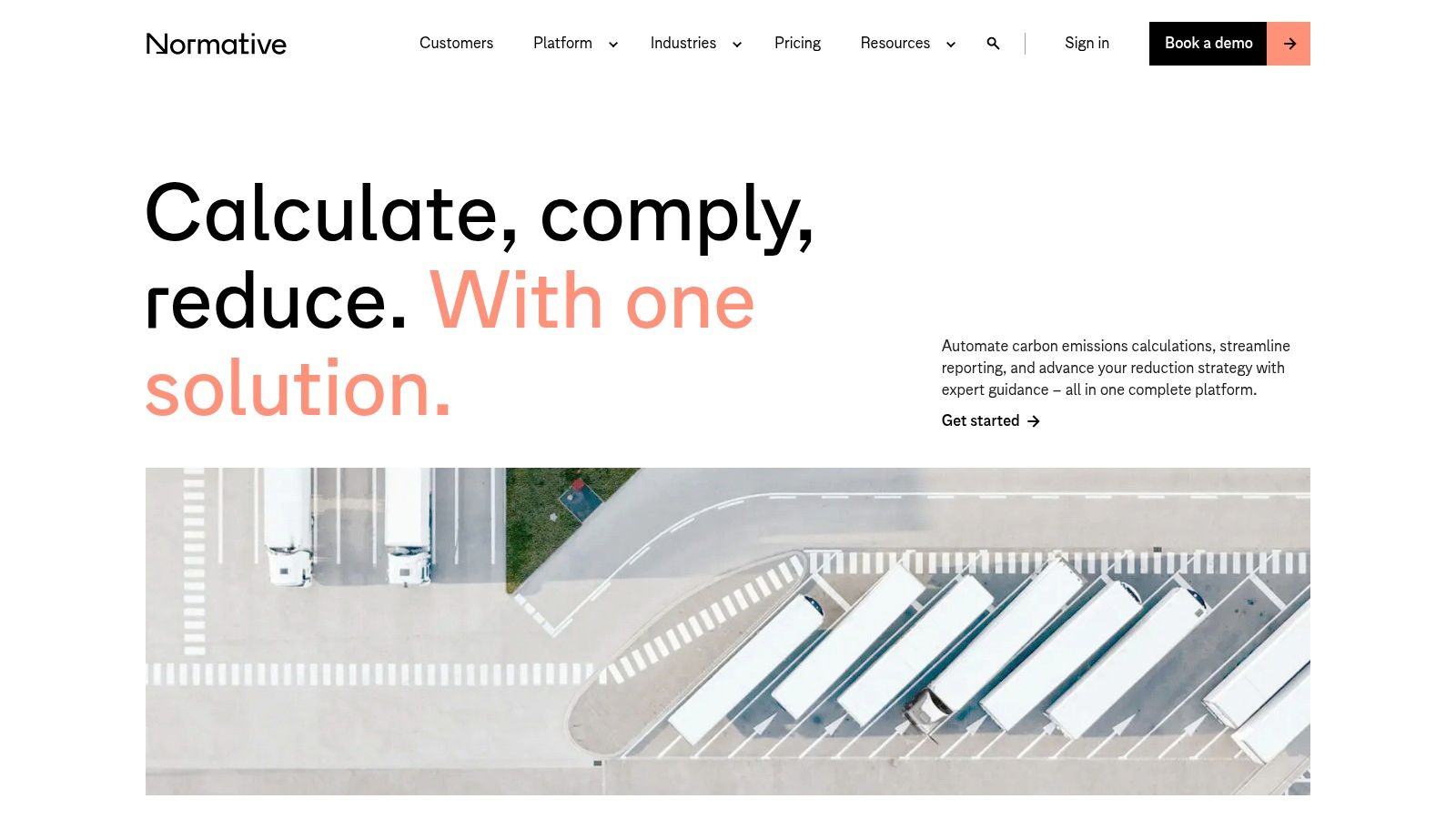
For logistics and supply chain managers in the CZ region grappling with the complexities of Scope 3 emissions, Normative offers a robust solution for mapping and analyzing supply chain carbon footprints. This feature is invaluable for identifying emission hotspots and implementing targeted reduction strategies across the value chain. Chief Sustainability Officers and ESG teams can leverage the platform's scenario modeling capabilities to explore various carbon reduction initiatives and assess their potential impact, facilitating informed decision-making and strategic planning. Compliance and regulatory affairs professionals will find Normative's automated reporting features particularly useful for streamlining compliance with evolving CZ and EU environmental regulations. Enterprise organizations with complex supply chains benefit from the platform's ability to handle large datasets and integrate with existing accounting systems and business databases. This seamless integration minimizes data silos and ensures data consistency across the organization. Furthermore, environmental consultants and auditors can utilize Normative's scientifically rigorous methodology and transparent data processing to provide reliable and credible carbon accounting services to their clients.
One of Normative's key strengths lies in its innovative use of AI and machine learning. By analyzing financial data, the platform can estimate emissions even when detailed operational data is scarce, a common challenge for many businesses. This capability makes it particularly appealing to companies in the CZ region that may be in the early stages of their carbon accounting journey and lack granular emissions data. The platform's strong scientific methodology and commitment to transparency provide further assurance of the accuracy and reliability of the results. Moreover, Normative boasts an efficient onboarding process, allowing businesses to quickly get started and obtain initial carbon footprint assessments. This rapid time-to-value is a significant advantage for companies looking to quickly gain insights into their environmental performance and begin implementing sustainability initiatives.
While Normative offers numerous advantages, there are also some limitations to consider. The platform's reliance on financial data, while beneficial in some cases, can also be a drawback. For optimal results, high-quality and comprehensive financial data is essential. Companies with incomplete or inaccurate financial records may experience limitations in the accuracy of their carbon footprint calculations. Furthermore, while Normative offers a robust set of features, customization options for specific industry methodologies may be limited. This could be a concern for certain sectors in the CZ region with unique reporting requirements. As a relatively new platform, Normative's feature set is constantly evolving, which could lead to some initial limitations. Finally, pricing information is not readily available on the website, requiring potential users to contact the company for a personalized quote. This lack of transparency can make it difficult for businesses to budget for carbon accounting software and compare pricing with alternative solutions. Specific technical requirements for using Normative are not explicitly detailed on the website but likely involve system compatibility with existing accounting software and data formats.
Implementation of Normative generally begins with connecting the platform to the company's financial data sources. This connection can often be automated through existing API integrations with popular accounting software packages. The platform then uses its AI-powered engine to process the financial data and calculate the company's carbon footprint. Normative's customer support team provides guidance and assistance throughout the onboarding process, helping businesses understand the platform's functionalities and interpret the results.
While precise pricing is not publicly available, it is expected that Normative, similar to other enterprise-grade carbon footprint tracking software like Persefoni and Greenly, adopts a subscription-based model with pricing tiers based on the size of the organization, the complexity of its operations, and the required features. Potential users should contact Normative directly for a personalized quote and to discuss specific implementation needs. For businesses in the CZ region looking for a comprehensive, AI-driven solution for carbon accounting, Normative offers a powerful platform for measuring, managing, and reducing their environmental impact. The platform's automated approach, coupled with its robust data analysis capabilities, makes it a valuable tool for navigating the complexities of carbon accounting and achieving sustainability goals. You can explore their offerings further on their website: https://normative.io
7. Watershed
Watershed is a leading carbon footprint tracking software designed specifically for enterprise-level organizations looking to accurately measure, reduce, and report their emissions. Unlike more generalized carbon calculators, Watershed offers a comprehensive suite of tools tailored for companies with complex operations and intricate supply chains. This robust platform goes beyond basic carbon accounting, providing in-depth analysis, scenario planning, and supplier engagement functionalities crucial for meeting ambitious sustainability targets. Watershed's focus on data accuracy, auditability, and integration with existing business systems makes it a powerful ally for businesses in the CZ region striving to navigate the evolving landscape of carbon regulations and stakeholder expectations.
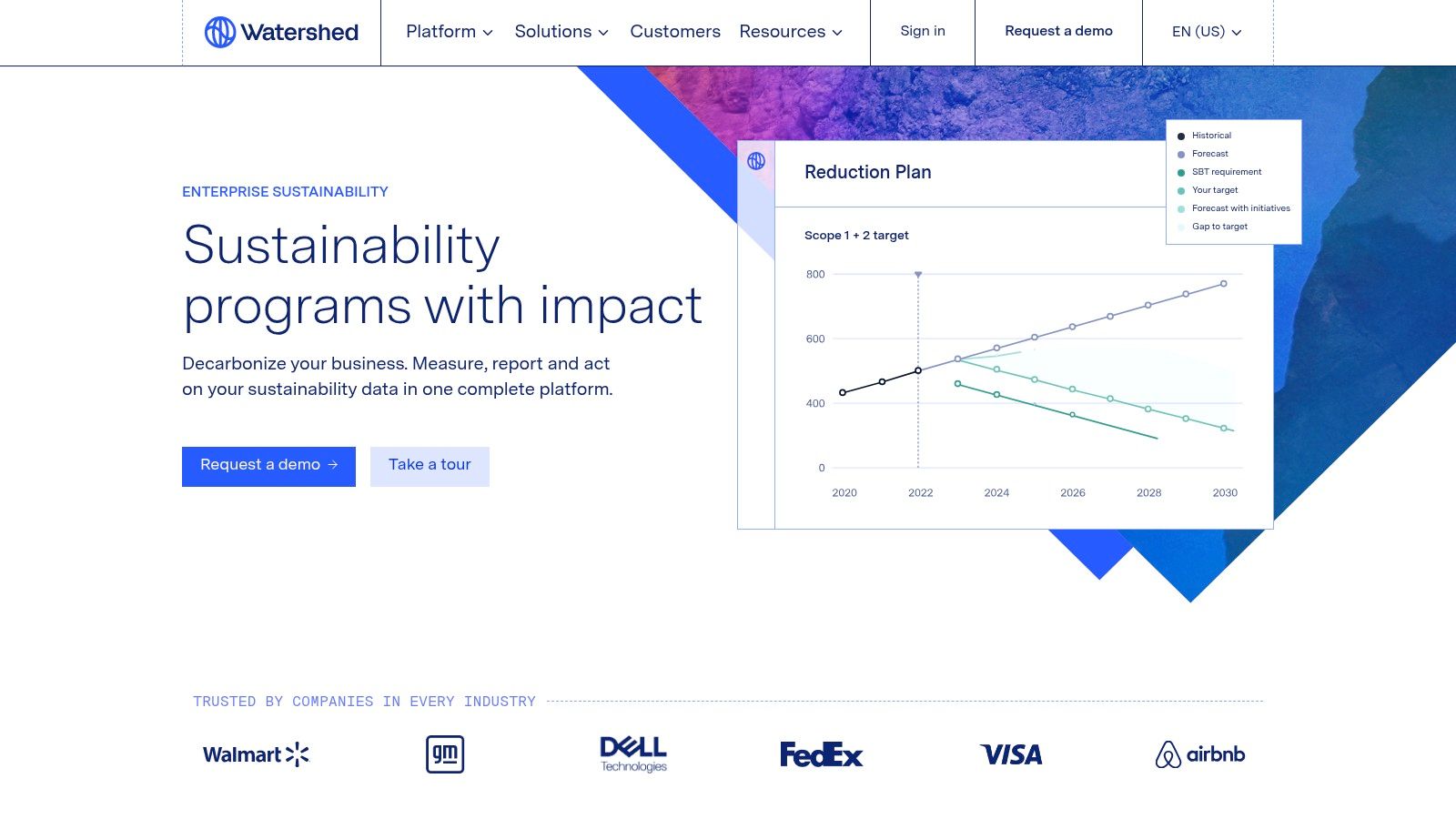
For large enterprises operating in the CZ region, particularly those in logistics and supply chain management, accurately tracking and managing carbon emissions across their entire value chain is paramount. Watershed addresses this challenge by offering enterprise-grade carbon accounting with audit-ready data, a crucial feature for regulatory compliance and investor reporting. Its advanced API integrations enable seamless connection with existing business systems and databases, streamlining data collection and analysis. This is particularly valuable for companies with complex data landscapes, automating the process of gathering emissions data from various sources. Watershed's emphasis on scope 3 emissions tracking, which encompasses emissions from a company's supply chain, empowers businesses to identify and address their most significant indirect emission sources. This is further enhanced by built-in supplier engagement tools, facilitating collaborative efforts to reduce emissions throughout the value chain.
One of Watershed's standout features is its focus on climate scenario analysis and risk assessment. This allows businesses to model the potential impacts of different climate change scenarios on their operations, empowering them to develop proactive mitigation strategies and enhance their resilience. The custom reporting and dashboard creation capabilities enable tailored visualizations and insights, making it easier to communicate progress and identify areas for improvement. This level of data granularity and reporting flexibility is invaluable for Chief Sustainability Officers and ESG teams striving to demonstrate the impact of their sustainability initiatives.
While Watershed offers significant advantages for large enterprises, its focus on this segment also presents some limitations. Smaller businesses may find its robust features and higher price point excessive for their needs. The platform's complexity also requires dedicated resources for implementation and ongoing management, potentially posing a challenge for organizations with limited in-house expertise. Limited self-service options for smaller implementations further reinforce its orientation towards larger, more resource-rich companies. Learn more about Watershed and its relevance to Czech businesses navigating carbon footprint logistics.
While pricing information for Watershed isn't publicly available, it's understood to be tailored to each client's specific needs and scale of operations. Given its enterprise focus, it's generally considered a higher-priced option compared to carbon footprint tracking software designed for smaller businesses. Technical requirements for implementing Watershed involve integrating the platform with existing data sources via API connections. This typically requires dedicated IT resources and collaboration with Watershed's technical team to ensure a seamless setup and ongoing maintenance.
In the context of the CZ region, where regulations regarding carbon reporting are becoming increasingly stringent, Watershed offers a robust solution for large enterprises seeking a comprehensive carbon footprint tracking software. For logistics and supply chain managers, Chief Sustainability Officers, and compliance professionals, the platform’s advanced features and focus on auditability provide a reliable foundation for meeting regulatory requirements and demonstrating commitment to sustainability. While its complexity and price point may be prohibitive for smaller businesses, Watershed’s powerful capabilities make it a compelling choice for larger organizations in the CZ region and beyond seeking to effectively manage their carbon footprint and navigate the evolving regulatory landscape of carbon emissions.
8. CarbonChain
For businesses deeply entrenched in complex supply chains, particularly those dealing with physical commodities, accurately tracking embodied carbon can be a significant challenge. Generic carbon footprint tracking software often falls short, lacking the granular detail and specialized methodologies required to capture the true carbon intensity of goods moving through a global network. This is where CarbonChain shines. This sophisticated platform specializes in supply chain carbon accounting, empowering commodity traders, manufacturers, and other businesses to gain a precise understanding of the carbon footprint embedded within their products, from origin to final destination. CarbonChain earns its place on this list due to its laser focus on providing verifiable, shipment-level insights for industries grappling with the complexities of physical supply chains.
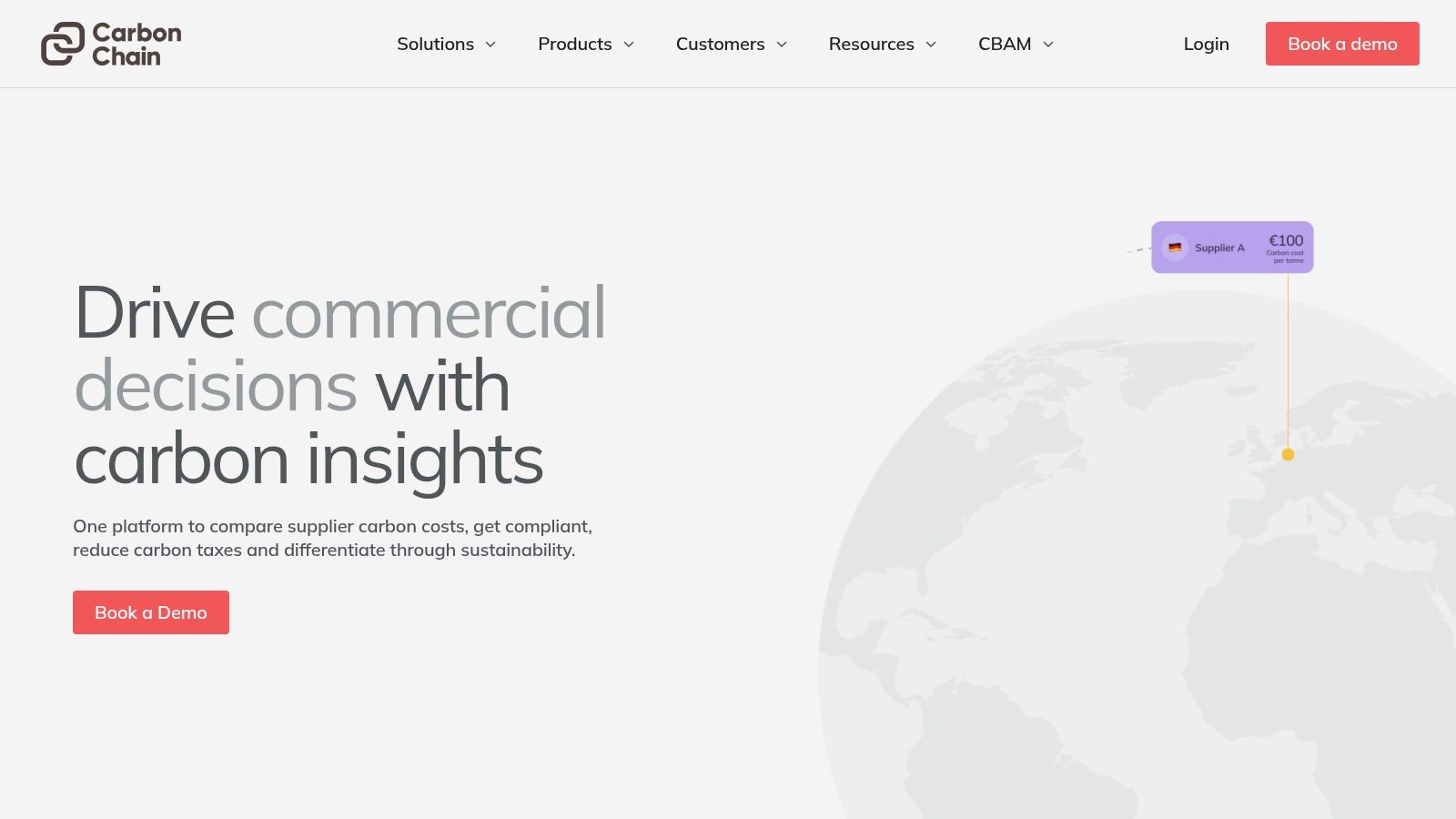
CarbonChain distinguishes itself through its granular approach. Unlike solutions that offer broad-stroke estimations, it delves into the specifics of each shipment. This shipment-level tracking allows businesses to pinpoint carbon hotspots within their supply chains, identify areas for improvement, and make data-driven decisions to reduce their overall environmental impact. This level of granularity is particularly crucial for industries operating within the CZ region, where increasing regulatory scrutiny and consumer demand for transparency are pushing businesses to demonstrate concrete actions towards decarbonization.
One of CarbonChain's core strengths lies in its integration capabilities. The platform seamlessly connects with existing logistics and supply chain management systems, automating data collection and ensuring a streamlined workflow. This integration eliminates manual data entry, reducing the risk of errors and freeing up valuable time for analysis and optimization. Real-time carbon intensity monitoring and alerts further enhance the platform's utility, providing businesses with immediate insights into emerging carbon risks and enabling proactive mitigation strategies. Furthermore, CarbonChain employs commodity-specific carbon accounting methodologies, ensuring accurate and relevant calculations based on the unique characteristics of different materials and production processes. This specialized approach makes it particularly well-suited for businesses dealing in commodities like agriculture, metals, and minerals.
While pricing information is not readily available on CarbonChain's website, it's safe to assume, given its enterprise-level capabilities, that it caters to larger organizations with complex supply chain needs. Businesses interested in exploring CarbonChain should contact their sales team for a tailored quote and a demonstration of the platform's features. Implementation typically involves integrating the platform with existing systems via its API-first architecture. While some technical expertise may be required for initial setup and configuration, CarbonChain's support team provides assistance throughout the onboarding process.
Compared to more generalized carbon footprint tracking software, CarbonChain excels in its specialized approach to supply chain carbon accounting. However, this specialization also represents a potential limitation. Businesses seeking a comprehensive carbon management solution that encompasses scope 1 and 2 emissions alongside supply chain emissions might find CarbonChain's focus too narrow. While the platform offers robust tracking for scope 3 emissions, particularly within category 1 (purchased goods and services), its capabilities for scope 1 and 2 are less extensive. Therefore, companies requiring comprehensive carbon management might need to consider supplementing CarbonChain with additional tools to cover all emission scopes.
For logistics and supply chain managers, Chief Sustainability Officers and ESG teams, compliance and regulatory affairs professionals, and environmental consultants and auditors working within the CZ region, CarbonChain offers a powerful tool for navigating the complexities of supply chain decarbonization. Its granular tracking, data accuracy, and specialized methodologies provide valuable insights for optimizing supply chains, meeting regulatory requirements, and responding to growing stakeholder demands for transparency and sustainability. However, businesses should carefully consider their specific needs and ensure that CarbonChain's specialized focus aligns with their overall carbon management strategy.
Carbon Footprint Software Feature Comparison
| Platform | Core Features & Capabilities | User Experience & Quality ★★★★☆ | Value & Pricing 💰 | Target Audience 👥 | Unique Selling Points ✨ |
|---|---|---|---|---|---|
| 🏆 Carbonpunk | Real-time CO₂ tracking, AI route optimization, ESG reporting | 95%+ accuracy, customizable dashboards | Contact for pricing, high ROI | Large enterprises with complex supply chains | AI-driven actionable insights, audit-ready reports |
| Greenly | Scope 1-3 tracking, AI data analysis, real-time dashboard | User-friendly, strong automation | Can be costly for small businesses | Businesses of all sizes | Comprehensive emissions tracking, great support |
| Sustain.Life | Guided workflows, carbon offset marketplace, reporting | Transparent pricing, SMB-focused | Clear pricing tiers, affordable | Small to medium businesses | Carbon offset integration, user guidance |
| Planetly (by OneTrust) | Full scope tracking, ERP integration, science-based targets | Enterprise-grade accuracy and security | High cost, pricing not transparent | Enterprises needing deep integrations | Strong system integrations, regular emissions updates |
| Plan A | End-to-end carbon & ESG, supply chain tools, LCA | Comprehensive, mid to enterprise complexity | Moderate to high, may not suit SMBs | Mid-market to enterprise clients | Broad ESG integration, supply chain engagement |
| Normative | AI financial data carbon calc, scenario modeling | Innovative, efficient onboarding | Pricing not public | Businesses with quality financial data | Machine learning, finance-data driven |
| Watershed | Enterprise carbon accounting, API integrations, risk tools | High auditability, reliable platform | High price, enterprise focus | Large enterprises with complex operations | Strong scope 3 management, climate risk analysis |
| CarbonChain | Shipment-level tracking, commodity-specific methods | Specialized, data-accurate | Pricing info not public | Commodity traders, manufacturers | Granular supply chain focus, API-first architecture |
Making Informed Decisions for a Sustainable Future with Carbon Footprint Tracking Software
Choosing the right carbon footprint tracking software is crucial for effectively managing and reducing your environmental impact. From streamlined data collection and analysis with platforms like Greenly and Sustain.Life, to the comprehensive supply chain emissions tracking offered by CarbonChain and Watershed, the tools explored in this article offer diverse solutions for organizations of all sizes. Key takeaways include the importance of considering factors such as industry-specific features (like those offered by Planetly by OneTrust for complex supply chains), integration capabilities with existing systems, and reporting functionalities for regulatory compliance (as provided by Plan A and Normative). For CZ businesses specifically, understanding local regulations and emissions factors is critical when implementing these tools. Logistics and supply chain managers, ESG teams, and other stakeholders within enterprise organizations should carefully evaluate their specific needs and resources to select the most suitable carbon footprint tracking software.
Whether you are a sustainability consultant conducting audits, a Chief Sustainability Officer setting organizational targets, or a compliance professional navigating evolving regulations, leveraging carbon footprint tracking software is no longer optional, but a necessary step towards achieving impactful sustainability goals. By embracing these technologies and incorporating data-driven insights into decision-making processes, businesses in the CZ region and beyond can contribute to a more sustainable future. Take control of your environmental impact today. Explore Carbonpunk, a cutting-edge carbon footprint tracking software designed for complex supply chains and automated reporting, and pave the way for a more sustainable tomorrow. Carbonpunk offers tailored solutions to help your organization measure, manage, and reduce its carbon footprint with precision and efficiency.
Article created using Outrank